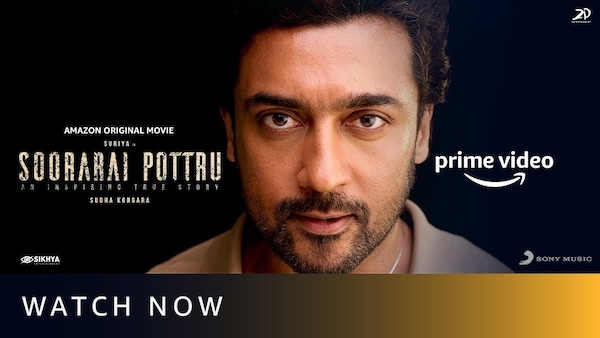Will a hybrid model of OTT and theatrical releases be the new normal for the films?
A trend of joint production with the streaming giant is also making a way into the industry

Award-winning film Soorarai Pottru starring Suriya released on Amazon Prime
Last Updated: 06.09 PM, Sep 28, 2021
With the theatres slowly opening up across the country, filmmakers are contemplating having either theatrical releases for their films or continue with the hybrid model of OTT and theatrical releases. Coming to one conclusion on this looks like a backbreaking task. However, many filmmakers and analysts think that the OTT model is here to stay and will continue to co-exist with theatres.
Narayanan who will be launching his first Hindi film Phantom Hospital, a medical thriller, told moneycontrol: “Yes, the hybrid model is the future. OTT and theatres will live side-by-side even after things normalise, as they are different models.” The OTT platforms will continue to get traction as many people take subscriptions for its wide variety of content.
Some also predict joint production of content. Recently, the Tamil anthology series Navarasa, with nine shorts exploring nine emotions, from awe to amusement, was co-produced by Mani Ratnam and Jayendra Panchapakesan for Netflix. Subash Babu, a film enthusiast and critic based in Kerala, told the portal, “The next big trend on OTT is co-producing movies, starting with Hindi and other languages." Narayanan further added that the hybrid model will help the industry in the long run.
It is safe to say that OTT platforms have saved many films during the lockdown induced by the COVID-19 pandemic. Many films opted for a direct OTT release as theatres were shut unprecedently across the country. There were no other options either. And south Indian films too brave the odds of a new medium and reportedly broke all viewerships records on Amazon Prime Video. Fifty per cent of the viewers of Tamil, Telugu, Malayalam and Kannada films were from outside their respective states. Films like Drishyam 2, The Great Indian Kitchen, Soorarai Pottru, Maara, Joji, Malik and Home gained immense popularity on streaming platforms and won the hearts of people across the country for their content. Actors such as Suriya, Fahadh Faasil, Sai Pallavi and Allu Arjun too became known faces around the country.
The pan India response was unexpected. Dhilip Kumar, director of the R. Madhavan-starrer Tamil film Maara believed the film was made for theatres but like many other filmmakers, he was forced to opt for an OTT release. OTT was a new medium for the Tamil film industry and Maara was one of the first five films to release on the platform. However, the response was unexpected, said the director, adding that the social media was in a frenzy and that he did not expect viewers from other states than Tamil Nadu to watch the film and give him good feedback. He admitted that he wouldn't have received such a response had the film been released in theatres locally.
The Malayalam film industry was a late riser when it comes to exploring the OTT medium. Many completed films were stuck as they could not be released in theatres. As the makers could not have waited any longer due to the huge investment costs that the producer had to recover, films like Malik starring Fahadh Faasil sold their rights to Amazon Prime Video. The film Malik had postponed its theatrical release several times due to the ongoing pandemic and the changing lockdown rules. However, streaming giants believe the makers had started engaging with the platforms before the pandemic and that the pandemic led to more innovation and experimentation in storytelling with no limitations and restrictions.

